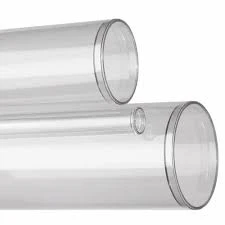डिस . 25, 2024 14:57 Back to list
Understanding PVC Pipes and Fittings for Effective Plumbing Solutions
Understanding PVC Pipes and Fittings A Comprehensive Guide
PVC, or polyvinyl chloride, has become one of the most widely used materials in the plumbing and construction industries. Its versatility, durability, and resistance to various chemicals make it an excellent choice for a variety of applications, particularly in piping systems. This article delves into the characteristics, advantages, applications, and installation aspects of PVC pipes and fittings.
What is PVC?
PVC is a synthetic plastic polymer that is produced by polymerizing vinyl chloride. Its lightweight yet sturdy nature, coupled with good chemical resistance, makes it an ideal materials in sectors ranging from construction to medical equipment. In the plumbing world, PVC pipes are often used for water supply, drainage, and irrigation systems.
Advantages of PVC Pipes
1. Durability PVC pipes are resistant to corrosion, making them a suitable choice for both above-ground and underground applications. They do not rust or corrode like metal pipes, ensuring a longer lifespan.
2. Lightweight Compared to other materials, such as metal or concrete, PVC is much lighter. This quality makes it easier to handle and install, which can lead to significant labor cost savings during installation.
3. Cost-Effective PVC pipes are generally less expensive than other piping materials. Their affordability, combined with their longevity and low maintenance costs, makes them an economical choice for many projects.
4. Chemical Resistance PVC is resistant to many corrosive chemicals, which allows it to be used in a wide range of applications, including industrial settings.
5. Low Thermal Conductivity PVC exhibits low thermal conductivity, making it less susceptible to temperature changes. This characteristic helps to maintain the temperature of the water flowing through the pipes.
Applications of PVC Pipes
PVC pipes have a myriad of applications due to their advantageous properties. Here are some common uses
- Residential Plumbing PVC is commonly used for water supply lines, sewage lines, and drainage systems in residential buildings
.pvc pipes and fittings

- Irrigation Systems In agriculture, PVC pipes play a crucial role in irrigation systems, allowing efficient distribution of water to crops.
- Industrial Applications Many industries utilize PVC pipes for transporting chemicals and corrosive materials, thanks to their durability and chemical resistance.
- Conduits for Electrical Wiring PVC is also used as conduits for electrical wiring, providing protection against moisture and physical damage.
Fittings and Accessories
PVC pipes are complemented by a wide range of fittings, including elbows, tees, couplings, and valves. These fittings allow for versatile configurations and adjustments in piping systems. The fittings are made from the same PVC material, ensuring compatibility and durability.
1. Elbow Fittings These are used to make a change in direction in the piping system. They are available in various angles, typically 45 and 90 degrees.
2. Tees Tees allow for branching the flow of water or other materials within a piping system.
3. Couplings These fittings are used to connect two pieces of PVC pipe together, ensuring a watertight seal.
4. Valves PVC valves control the flow of liquids or gases within the system and can be used to prevent backflow or drain pipes when necessary.
Installation Considerations
Installing PVC pipes and fittings involves cutting the pipes to the required lengths, deburring the edges, and applying a special solvent cement to create a strong, leak-proof bond. It is vital to ensure that the pipes are properly aligned and supported to prevent stress and potential failure over time.
Conclusion
PVC pipes and fittings offer an array of benefits that make them ideal for various plumbing and construction applications. Their durability, cost-effectiveness, and ease of installation contribute to their widespread use. Whether for residential plumbing, irrigation, or industrial applications, PVC remains a top choice for professionals in the field. By understanding the advantages and characteristics of PVC, stakeholders can make informed decisions that enhance the efficiency, safety, and longevity of their projects.
-
Durable PP Rigid Sheet: Lightweight, Chemical Resistant Solutions
NewsAug.21,2025
-
PVC Grey Sheet for Extraction: Chemical Resistant & Durable
NewsAug.19,2025
-
Durable PVC Pipe Fittings for Plumbing & Irrigation Needs
NewsAug.18,2025
-
HDPE Steel Belt Reinforced Spiral Corrugated Pipe | High Strength
NewsAug.17,2025
-
HDPE Pipe Fittings: Durable, Leak-Proof Solutions
NewsAug.16,2025
-
Premium CPVC Sheet: High-Temp & Chemical Resistant Solutions
NewsAug.15,2025

